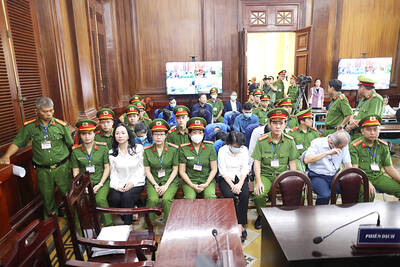The global chemical weapons watchdog on Wednesday for the first time explicitly blamed Syria for toxic attacks, saying that Syrian President Bashar al-Assad’s air force used the nerve gas sarin and chlorine three times in 2017.
The findings came in the first report from a new investigative team set up by the Organisation for the Prohibition of Chemical Weapons (OPCW) to identify the perpetrators of attacks in Syria’s ongoing nine-year-long civil war.
Western nations and rights groups condemned Syria following the release of the report, which will now go to the UN among others to decide what and if any further action should be taken.
In March 2017, Syrian fighter jets dropped sarin on the northern village of Lataminah and a military helicopter dropped a barrel bomb full of chlorine on the same village, the probe found.
The OPCW said that the team “has concluded that there are reasonable grounds to believe that the perpetrators of the use of sarin as a chemical weapon in Lataminah in 2017 ... and the use of chlorine ... were individuals belonging to the Syrian Arab Air Force.”
Member states of the OPCW agreed two years ago to give The Hague-based watchdog new powers to attribute blame for attacks, despite the objections of Syria and its ally Russia. Previously, it had only been able to say whether chemical strikes had occurred, but without naming the perpetrators.
The OPCW said that the new Investigation and Identification Team (IIT) could not identify the precise chain of command, but that orders for the attacks must have come from senior commanders.
“Attacks of such a strategic nature would have only taken place on the basis of orders from the higher authorities of the Syrian Arab Republic military command,” IIT coordinator Santiago Onate-Laborde said.
“Even if authority can be delegated, responsibility cannot. In the end, the IIT was unable to identify any other plausible explanation,” he said in a statement.
Western nations and human rights groups praised the OPCW report, saying it proved Syria continued chemical attacks on its own population.
US Secretary of State Mike Pompeo said that “no amount of disinformation from [al-]Assad’s enablers in Russia and Iran can hide the fact that the Assad regime is responsible for numerous chemical weapons attacks.”
“The unchecked use of chemical weapons by any state presents an unacceptable security threat to all states and cannot occur with impunity,” Pompeo said in a statement.
German Minister for Foreign Affairs Heiko Maas agreed.
“Such a blatant violation of international law must not go unpunished,” he said.
Human Rights Watch’s UN director Louis Charbonneau said that the “OPCW’s conclusions should be used to support criminal justice for the individuals responsible.”
However, OPCW head Fernando Arias said that the IIT was not there to name individuals.

Republican US lawmakers on Friday criticized US President Joe Biden’s administration after sanctioned Chinese telecoms equipment giant Huawei unveiled a laptop this week powered by an Intel artificial intelligence (AI) chip. The US placed Huawei on a trade restriction list in 2019 for contravening Iran sanctions, part of a broader effort to hobble Beijing’s technological advances. Placement on the list means the company’s suppliers have to seek a special, difficult-to-obtain license before shipping to it. One such license, issued by then-US president Donald Trump’s administration, has allowed Intel to ship central processors to Huawei for use in laptops since 2020. China hardliners

A top Vietnamese property tycoon was on Thursday sentenced to death in one of the biggest corruption cases in history, with an estimated US$27 billion in damages. A panel of three hand-picked jurors and two judges rejected all defense arguments by Truong My Lan, chair of major developer Van Thinh Phat, who was found guilty of swindling cash from Saigon Commercial Bank (SCB) over a decade. “The defendant’s actions ... eroded people’s trust in the leadership of the [Communist] Party and state,” read the verdict at the trial in Ho Chi Minh City. After the five-week trial, 85 others were also sentenced on

‘DELUSIONAL’: Targeting the families of Hamas’ leaders would not push the group to change its position or to give up its demands for Palestinians, Ismail Haniyeh said Israeli aircraft on Wednesday killed three sons of Hamas’ top political leader in the Gaza Strip, striking high-stakes targets at a time when Israel is holding delicate ceasefire negotiations with the militant group. Hamas said four of the leader’s grandchildren were also killed. Ismail Haniyeh’s sons are among the highest-profile figures to be killed in the war so far. Israel said they were Hamas operatives, and Haniyeh accused Israel of acting in “the spirit of revenge and murder.” The deaths threatened to strain the internationally mediated ceasefire talks, which appeared to gain steam in recent days even as the sides remain far

RAMPAGE: A Palestinian man was left dead after dozens of Israeli settlers searching for a missing 14-year-old boy stormed a village in the Israeli-occupied West Bank US President Joe Biden on Friday said he expected Iran to attack Israel “sooner, rather than later” and warned Tehran not to proceed. Asked by reporters about his message to Iran, Biden simply said: “Don’t,” underscoring Washington’s commitment to defend Israel. “We are devoted to the defense of Israel. We will support Israel. We will help defend Israel and Iran will not succeed,” he said. Biden said he would not divulge secure information, but said his expectation was that an attack could come “sooner, rather than later.” Israel braced on Friday for an attack by Iran or its proxies as warnings grew of